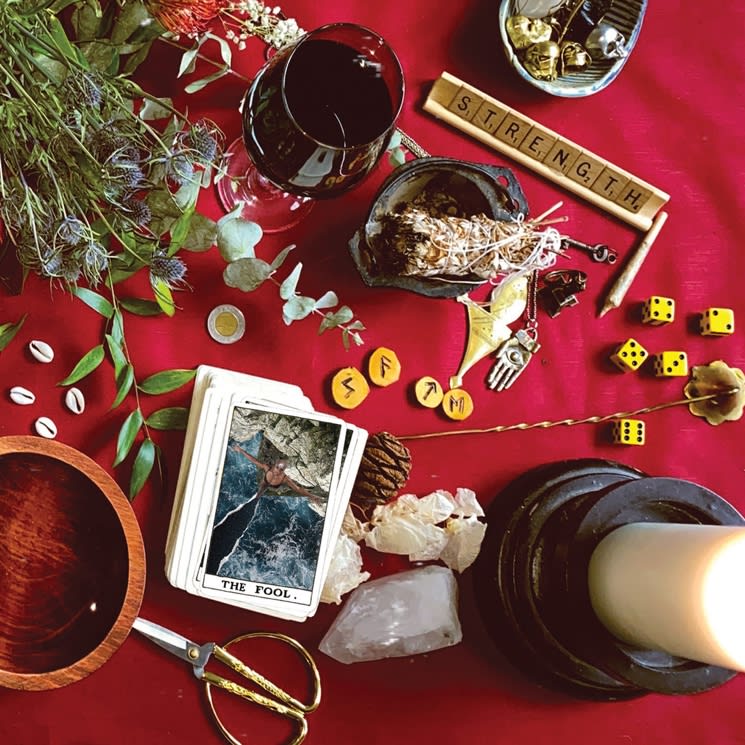Named for one of the tarot cards, SATE's sophomore studio album, The Fool, embodies new beginnings and opportunities. When pulled upright, the namesake tarot card represents curiosity, discovery and spontaneity, but if pulled reversed, it could indicate one's hesitations to embark on a new project. Resonating with both definitions, SATE (the daughter of Canadian blues and jazz legend Salome Bey) has publicly discussed the reservations she had throughout the songwriting and recording process. Thankfully, her feelings ultimately subsided, resulting in a thought-provoking rock album steeped in sonic experimentation and exploration.
At its core, The Fool is concise and straightforward. While SATE's sound is rooted in the blues, there are hints of electronica, ambient pop and grunge sprinkled throughout the album. Lyrically, "Howler" is a fairytale gone wrong ("Dress me up then dress me down / Pose me in the way you like / 'Cause I'm not pretty when I frown / Nod my head 'cause I play nice"), and the arrangement keeps it real with blues-based guitar riffs and grimy licks. The subtle electronics recall St. Vincent, but the similarities stop there — SATE is unequivocally her own being, bringing a powerful sense of cosmic energy into guitar-based rock. Other highlights include punchy, riff-laden electro-rocker "Famous," feisty early number "Dirty Little Lie," and the grand "Weight on Me."
SATE's grand scope is furthered with a series of interludes that punctuate the tracklist, including soft-spoken poetry and ambient distortion sounds. Opening track "0: loofeht" acts as an overture with samples from each of the album's tracks. By doing this, SATE knowingly prepares the listener for what's to come by planting a sonic seed before the album properly gets going. The gesture is welcoming and allows for a sense of familiarity throughout the listening experience. Possibly the most significant moment comes near the end with "#sfc," a spoken-word piece featuring Ursula Rucker that discusses doubts, fears and ultimate desires for creating art. It's an existential moment on the record that forces listeners to remove themselves from the album and witness the body of work from the artist's point of view.
It's a powerful moment that leads in nicely to the album-closing title track, which pairs emotional vocals with a poppy melody. Recalling '90s pop rather than rock, it showcases SATE's versatility and ends the album on a powerful and experimental note. It shows SATE's musical compass pointing her in ever-changing directions. The Fool is significantly less accessible than 2016's RedBlack&Blue, and in challenging herself to expand her sound and narrative as an artist, SATE has arrived at a place of personal vulnerability and musical thrill.
(CLK Creative Works)At its core, The Fool is concise and straightforward. While SATE's sound is rooted in the blues, there are hints of electronica, ambient pop and grunge sprinkled throughout the album. Lyrically, "Howler" is a fairytale gone wrong ("Dress me up then dress me down / Pose me in the way you like / 'Cause I'm not pretty when I frown / Nod my head 'cause I play nice"), and the arrangement keeps it real with blues-based guitar riffs and grimy licks. The subtle electronics recall St. Vincent, but the similarities stop there — SATE is unequivocally her own being, bringing a powerful sense of cosmic energy into guitar-based rock. Other highlights include punchy, riff-laden electro-rocker "Famous," feisty early number "Dirty Little Lie," and the grand "Weight on Me."
SATE's grand scope is furthered with a series of interludes that punctuate the tracklist, including soft-spoken poetry and ambient distortion sounds. Opening track "0: loofeht" acts as an overture with samples from each of the album's tracks. By doing this, SATE knowingly prepares the listener for what's to come by planting a sonic seed before the album properly gets going. The gesture is welcoming and allows for a sense of familiarity throughout the listening experience. Possibly the most significant moment comes near the end with "#sfc," a spoken-word piece featuring Ursula Rucker that discusses doubts, fears and ultimate desires for creating art. It's an existential moment on the record that forces listeners to remove themselves from the album and witness the body of work from the artist's point of view.
It's a powerful moment that leads in nicely to the album-closing title track, which pairs emotional vocals with a poppy melody. Recalling '90s pop rather than rock, it showcases SATE's versatility and ends the album on a powerful and experimental note. It shows SATE's musical compass pointing her in ever-changing directions. The Fool is significantly less accessible than 2016's RedBlack&Blue, and in challenging herself to expand her sound and narrative as an artist, SATE has arrived at a place of personal vulnerability and musical thrill.
